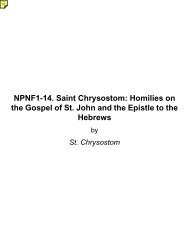Feminist Theology - The Fishers of Men Ministries
Feminist Theology - The Fishers of Men Ministries
Feminist Theology - The Fishers of Men Ministries
You also want an ePaper? Increase the reach of your titles
YUMPU automatically turns print PDFs into web optimized ePapers that Google loves.
<strong>of</strong> understanding and relating, recognizing that equality <strong>of</strong> opportunity is hollow ifstructures remain masculine and patriarchal. Human culture itself must be re-ordered. Instronger forms, radical feminism rejects the masculine and patriarchal as being the source<strong>of</strong> disorder and evil. Rapprochement with men is not the objective; emasculation is.Finally, a further step has been taken with the development <strong>of</strong> ec<strong>of</strong>eminism. Ec<strong>of</strong>eminismshares radical feminism's critique <strong>of</strong> male-dominated human culture, but observes that thedeleterious effects go far beyond the human sphere. <strong>The</strong> damage done to oppressedgroups is paralleled by the damage done to the natural world. Drawing strong connectionsbetween women and the earth, ec<strong>of</strong>eminists propose that the adoption <strong>of</strong> a feminist ethicis the only way to address the ills threatening nature and human society.<strong>Feminist</strong> theology shares these concerns with feminism, but must address a furtherdilemma as it seeks to reclaim the Christian tradition. Within Christian theology liepowerful principles which resonate with feminist concerns. God has almost without failbeen recognized as being without or beyond gender. While there may be arguments overwhether gender is a category which applies to divinity (i.e., whether God is gender-less orgender-ful), rarely has anyone in the theological mainstream dared to argue that God ispredominantly <strong>of</strong> one gender. When coupled with the Biblical themes <strong>of</strong> liberation andself-actualization, these provide Christianity with significant means to combat oppressionand injustice.On the other hand, the forms <strong>of</strong> scripture, creed, and historical theology in which thetradition is carried are encased in (critics would say are saturated with and formed by)male-dominance. It is probably safe to say that no other type <strong>of</strong> theology <strong>of</strong> liberationentails such a pervasive re-imaging and re-vocalizing <strong>of</strong> the tradition. <strong>Feminist</strong>s are veryaware <strong>of</strong> the nuances and sway <strong>of</strong> language. It is not just the naming that is the problem,but that the naming establishes the relationships, the gridwork through which faith ismediated to women and men.Within theological feminism, a distinction is made between revolutionary and reformistfeminists. Revolutionary feminists find the Christian tradition irredeemably patriarchaland oppressive. It looks to other traditions or to new theologies.. Reformists recognize theliabilities and the potentialities <strong>of</strong> the Christian tradition, and seek to reformulate faithand practice. <strong>The</strong> two feminist theologians considered here fall within the reformistcamp.Rosemary Radford RuetherRosemary Radford Ruether is pr<strong>of</strong>essor at Garrett-Evangelical <strong>The</strong>ological Seminary inEvanston, Illinois. Although her background is pre-Vatican II Roman Catholic, she grewup with an open, expansive Catholicism nurtured by her mother (her father died when shewas 12). Early on she was introduced to ecumenical and feminist concerns. Althoughalmost all <strong>of</strong> her writing bears some relation to feminist concerns, she has written on amost diverse array <strong>of</strong> subjects. She has also taken serious the need to make resources
















